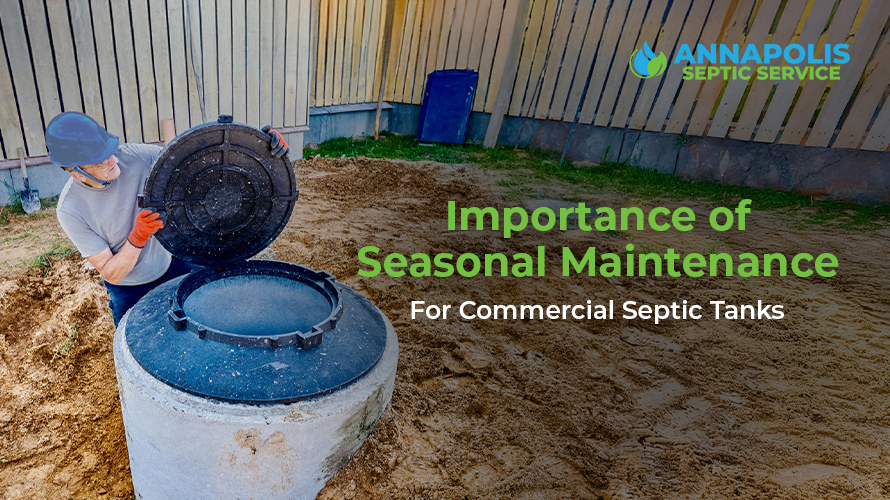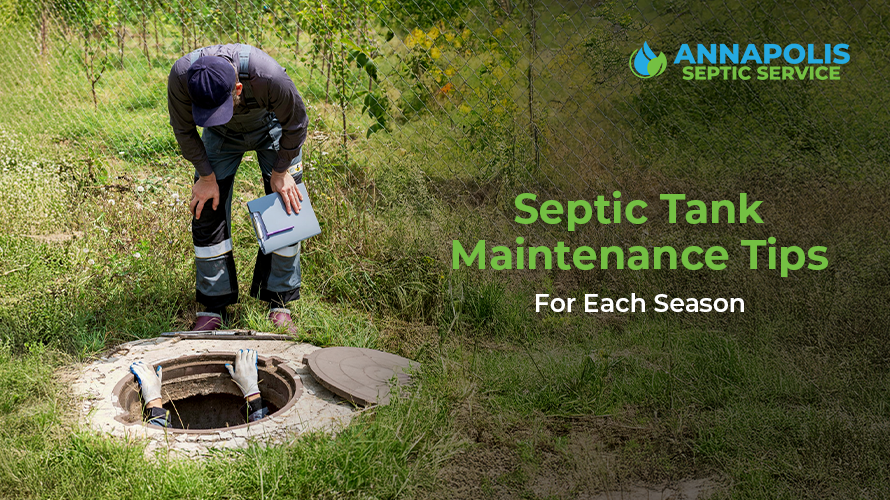Proper commercial septic tank maintenance in Annapolis is essential for preventing costly repairs and ensuring that your system operates smoothly throughout the year. The unique climate and soil conditions in Annapolis mean that your septic system faces different challenges with each season. In the spring, for example, thawing ground and increased rainfall can cause excess moisture to seep into your drain field, leading to potential backups. Summer brings its own set of challenges, such as increased water usage due to higher foot traffic in commercial properties, which can strain your septic system. As fall approaches, preparing for colder temperatures becomes a priority to prevent pipes from freezing and to clear away debris that could block your drain field. Even during the relatively mild winters in Annapolis, occasional freezes can still pose risks to your septic system if it’s not properly insulated and maintained.
By adapting your maintenance practices to these seasonal demands, you can significantly extend the lifespan of your septic system and avoid emergency repairs. Regular inspections, timely pumping, and adopting water-efficient practices can help maintain your system’s efficiency. Additionally, educating staff about what can and cannot go down the drains plays a vital role in preventing clogs and backups. In this blog, we’ll explore detailed maintenance strategies tailored to each season, helping you keep your commercial septic system in top condition year-round.
Spring: Fresh Start for Your Septic System
Spring is an ideal time to give your commercial septic system a fresh start. As the ground thaws, excess moisture can seep into your drain field, potentially causing backups. Begin the season with a professional inspection to identify any winter damage and schedule a septic tank pumping if necessary. Additionally, inspect the drain field for pooling water or foul odors, which are signs of potential issues. Fixing minor problems now can save you from costly repairs later.
To prepare your system for the warmer months, consider implementing water-efficient practices to manage increased usage. This might include installing low-flow fixtures and educating employees about responsible water use. Regular inspections can also help catch minor problems early, preventing them from escalating into more significant issues. Moreover, maintaining proper grading around your drain field prevents surface water from pooling and saturating the area, ensuring efficient drainage.
Summer: Handling the Heat and High Usage
In Annapolis, commercial properties often see a surge in traffic during the summer, putting extra pressure on septic systems. Increased water usage can strain your system, so it’s essential to manage this load carefully. Ensure grease traps are cleaned regularly if your business involves food services, as grease buildup can lead to blockages and backups. Scheduling frequent checks of your septic filter helps prevent clogs caused by higher wastewater volumes.
Additionally, maintaining proper landscaping around the drain field is crucial. Avoid planting deep-rooted trees or shrubs nearby, as roots can infiltrate and damage your septic system. Grass, with its shallow roots, is a safer choice. Keeping the area free from heavy vehicles and equipment prevents soil compaction, which can impede the drain field’s ability to absorb wastewater effectively.
Fall: Preparing for the Cold Months Ahead
Fall is all about preparation. As temperatures begin to drop, it’s time to ready your septic system for winter. Insulate exposed pipes to prevent freezing and clear the drain field of leaves and debris to maintain proper drainage. Scheduling a comprehensive inspection can help identify any vulnerabilities, allowing you to address them before winter hits.
Proper waste management is also essential during this time. Ensure that only septic-safe products are being used and educate staff about what should and shouldn’t go down the drains. This proactive approach can significantly reduce the risk of clogs and backups when the ground hardens in winter. Additionally, pumping your tank in the fall, if needed, reduces the risk of overflow during the cold months when the ground may freeze.
Winter: Keeping Your System Safe in Cold Weather
While winters in Annapolis are relatively mild, occasional freezes can still pose risks to your septic system. Prevent freezing by ensuring proper insulation of pipes and maintaining regular water use to keep things flowing. Avoid dumping large amounts of water into the system at once, as this can shock the system.
Using mulch or insulating covers over exposed parts of the system can provide extra protection against freezing. Regularly checking for signs of trouble, such as slow drains or foul odors, is vital. Addressing these issues promptly with professional help can prevent them from escalating into emergencies. Keeping a detailed record of all maintenance activities helps in identifying patterns and addressing issues proactively.
Conclusion: How Annapolis Septic Service Can Help

Proactive commercial septic tank maintenance in Annapolis is the key to avoiding emergency repairs and ensuring reliable performance. Annapolis Septic Service offers expert support with tailored maintenance plans to fit your needs. From routine inspections and pumping to emergency repairs, our team ensures that your septic system operates efficiently all year round.
With years of experience serving the Annapolis area, we understand the unique challenges posed by the region’s climate and soil conditions. Our experts can recommend customized solutions to enhance your septic system’s durability and efficiency. Whether you need seasonal maintenance tips, emergency repairs, or regular inspections, Annapolis Septic Service has you covered.
Reach out to us today for professional advice, reliable service, and maintenance plans designed to keep your system in top condition throughout the year!

